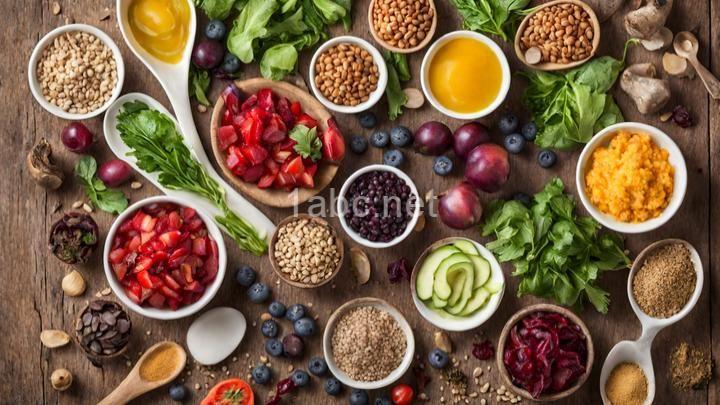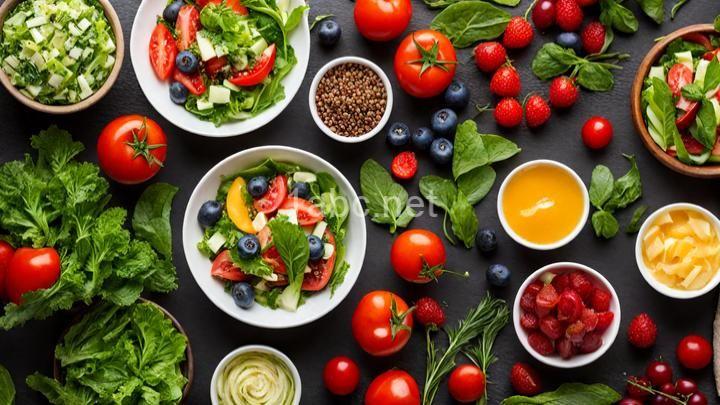Incorporating Superfoods into Your Salad: Wholesome Ingredients to Boost Nutrition

Introduction:
Welcome to our blog post on incorporating superfoods into salads! We are thrilled to embark on this journey with you as we explore the world of delicious and healthy salad options. Nutrition plays a vital role in our overall well-being, and by adding superfoods to our salads, we can enhance the nutritional value of our meals while enjoying a burst of flavor and variety.
I. Understanding Superfoods:
Before we dive into the world of superfood salads, let's take a moment to understand what superfoods are and the incredible nutritional benefits they offer. Superfoods are nutrient-dense ingredients that are packed with vitamins, minerals, antioxidants, and other beneficial compounds. They provide our bodies with a wide range of nutrients, helping us stay healthy and thrive.
Some popular examples of superfoods include kale, berries, quinoa, and chia seeds. Kale is rich in vitamins A, C, and K, as well as fiber and antioxidants. Berries, such as blueberries and strawberries, are loaded with antioxidants and vitamins, while quinoa is a complete protein source and an excellent alternative to grains. Chia seeds are a fantastic source of omega-3 fatty acids, fiber, and protein. These superfoods offer a diverse range of nutrients, making them valuable additions to any salad.
II. Selecting Base Ingredients:
Now that we understand the benefits of superfoods, let's discuss the importance of choosing the right base ingredients for our salads. Salad greens serve as the foundation of any great salad, and there are numerous options to consider. Spinach, arugula, and mixed greens are all fantastic choices. Each of these greens has its unique nutritional profile, with spinach being rich in iron and calcium, arugula packed with vitamin K and folate, and mixed greens offering a variety of nutrients. Experimenting with different greens adds excitement and variety to your salads while maximizing nutritional value.
III. Adding Colorful Vegetables and Fruits:
To make your superfood salad visually appealing and nutritionally balanced, it's essential to include a variety of colorful vegetables and fruits. These vibrant additions not only enhance the taste of your salad but also provide an array of nutrients. Consider adding cherry tomatoes, bell peppers, carrots, cucumbers, and even some fresh berries like strawberries or blueberries. These ingredients offer an abundance of vitamins, minerals, and antioxidants that contribute to overall well-being.
Cherry tomatoes, for example, are an excellent source of vitamin C and lycopene, a powerful antioxidant. Bell peppers provide high amounts of vitamin C and vitamin A, which supports immune function and healthy skin. Carrots are rich in beta-carotene, which converts to vitamin A in the body and promotes good vision. Cucumbers are hydrating and contain antioxidants that promote detoxification and support healthy skin. Fresh berries, such as strawberries and blueberries, are bursting with antioxidants and provide a natural sweetness to your salad.
IV. Incorporating Protein-Rich Superfoods:
To make your salad more filling and satisfying, incorporating protein-rich superfoods is essential. Protein is not only crucial for muscle repair and growth but also helps keep you feeling full for longer periods. Grilled chicken breast, boiled eggs, chickpeas, or black beans (for vegetarians/vegans), and salmon are excellent sources of protein that can be added to your superfood salad.
Grilled chicken breast is lean and packed with protein, providing essential amino acids for muscle repair. Eggs are an affordable and versatile protein source that also offers essential vitamins and minerals. Chickpeas and black beans are plant-based protein sources that add a delightful texture and taste to your salad. Salmon, rich in omega-3 fatty acids and high-quality protein, provides numerous health benefits, including heart health and brain function.
V. Enhancing with Healthy Fats:
Healthy fats are an essential component of a well-rounded diet, and incorporating them into your superfood salad is a great way to boost nutrition. Avocado slices, nuts, and seeds are excellent sources of healthy fats that can be added to your salad.
Avocado is a creamy and nutritious fruit that provides monounsaturated fats, which are heart-healthy and aid in nutrient absorption. Nuts, such as almonds, walnuts, or cashews, offer a satisfying crunch and are packed with healthy fats, protein, and essential minerals. Seeds like chia seeds, flaxseeds, or pumpkin seeds provide omega-3 fatty acids, fiber, and essential minerals. These healthy fats not only enhance the flavor and texture of your salad but also contribute to brain function and overall well-being.
For those with allergies or dietary restrictions, alternatives like sunflower seeds, sesame seeds, or even a drizzle of extra virgin olive oil can provide similar benefits.
VI. Dressing It Up:
No salad is complete without a delicious dressing! Instead of reaching for store-bought dressings that are often loaded with unhealthy additives and excessive sodium, why not try making your own nutritious dressings at home? Here are a few ideas:
- Olive oil and lemon juice: A simple yet flavorful dressing that highlights the taste of your salad ingredients.
- Greek yogurt: Mix Greek yogurt with herbs like dill or parsley, a squeeze of lemon, and a dash of garlic powder for a creamy and tangy dressing.
- Honey mustard: Combine Dijon mustard, honey, apple cider vinegar, and a drizzle of olive oil for a sweet and tangy dressing.
Remember to use dressings in moderation to ensure they complement the natural flavors of your salad without overpowering them.
VII. Mixing and Matching Superfoods:
One of the joys of creating superfood salads is the freedom to mix and match different ingredients to discover unique flavor combinations. Don't be afraid to experiment and let your creativity shine! Here are a few salad recipes that incorporate a variety of superfood ingredients:
- Superfood Power Salad: Mix kale, quinoa, cherry tomatoes, cucumbers, avocado, and grilled chicken, topped with a lemon olive oil dressing.
- Berry Spinach Salad: Combine spinach, mixed berries, walnuts, feta cheese, and balsamic vinaigrette for a refreshing and nutrient-packed salad.
- Mediterranean Quinoa Salad: Toss together cooked quinoa, bell peppers, cherry tomatoes, chickpeas, olives, feta cheese, and a Greek yogurt dressing for a Mediterranean-inspired delight.
Salads are incredibly versatile and can be enjoyed as a meal for any time of the day. Whether you prefer a light lunch, a filling dinner, or a refreshing side dish, superfood salads are an excellent choice.
Conclusion:
Incorporating superfoods into your salads is a fantastic way to boost nutrition and enhance the flavors of your meals. We hope this blog post has inspired you to explore the world of superfood salads, experiment with different ingredients, and create wholesome and delicious meals. The journey towards a healthier lifestyle is always more enjoyable when we share it together.
We would love to hear about your favorite salad recipes or your experiences with incorporating superfoods into your salads. Don't hesitate to share your thoughts and ideas in the comments section below. Happy salad-making!
FREQUENTLY ASKED QUESTIONS
What are superfoods?
Superfoods are types of foods that are rich in nutrients and believed to provide numerous health benefits. These foods are typically packed with vitamins, minerals, antioxidants, and other beneficial compounds. Superfoods are often considered to have superior nutritional value compared to other foods and are known to support overall health and well-being. Some common examples of superfoods include berries, leafy greens, nuts, seeds, fatty fish, whole grains, and certain spices. Adding superfoods to your diet can be a great way to increase your intake of key nutrients and promote optimal health.
Why should I incorporate superfoods into my salad?
Incorporating superfoods into your salad can provide a wide range of health benefits. Superfoods are nutrient-dense foods that are packed with vitamins, minerals, antioxidants, and other beneficial compounds. Here are a few reasons why adding superfoods to your salad is a great idea:
- Boosts Nutrient Content: Superfoods like leafy greens (spinach, kale), berries, nuts, seeds, and avocados are rich in essential vitamins and minerals, including vitamin C, vitamin K, potassium, and fiber. Incorporating these foods into your salad can help increase the overall nutrient content of your meal.
- Enhances Antioxidant Intake: Many superfoods are loaded with antioxidants, which help protect your cells from damage caused by harmful molecules called free radicals. Berries, dark leafy greens, tomatoes, and walnuts are excellent sources of antioxidants that can support your overall health.
- Promotes Heart Health: Several superfoods, such as avocados, nuts (like almonds and walnuts), and olive oil, are known to be heart-healthy. They contain heart-protective compounds like healthy fats (monounsaturated and polyunsaturated fats), omega-3 fatty acids, and antioxidants that may help reduce the risk of heart disease.
- Supports Weight Management: Superfoods are often low in calories but high in essential nutrients, making them an ideal addition to a salad for those trying to maintain or lose weight. They can help create a sense of fullness and provide sustained energy throughout the day.
- Improves Digestion: Many superfoods are rich in dietary fiber, which aids in digestion and promotes regular bowel movements. Leafy greens, chia seeds, and quinoa are examples of superfoods that can improve your digestive health when included in your salad.
Remember to choose a variety of superfoods to reap the maximum benefits. By incorporating them into your salad, you can boost the nutritional value and add delicious flavors and textures to your meal.
How do superfoods enhance the nutritional value of my salad?
Superfoods enhance the nutritional value of your salad by providing a rich source of vitamins, minerals, antioxidants, and other beneficial compounds. Here are a few examples of superfoods commonly found in salads and how they contribute to nutrition:
- Leafy greens like spinach and kale: These are packed with vitamins A, C, and K, as well as folate and minerals like iron and calcium. They also contain phytochemicals with antioxidant and anti-inflammatory properties.
- Berries (blueberries, strawberries, etc.): These are loaded with antioxidants that help protect cells from damage caused by free radicals. They are also high in fiber, vitamin C, and other essential nutrients.
- Nuts and seeds (almonds, chia seeds, flaxseeds): These are good sources of healthy fats, protein, fiber, and various vitamins and minerals. They can provide heart-healthy omega-3 fatty acids and add a satisfying crunch to your salad.
- Avocado: This fruit is rich in monounsaturated fats, which can help lower bad cholesterol levels. It also provides vitamins E and C, potassium, and dietary fiber.
- Quinoa: This pseudocereal is a complete protein, meaning it contains all nine essential amino acids. It is also rich in fiber, iron, magnesium, and other important nutrients.
By incorporating these superfoods, you can amplify the nutritional quality of your salad, making it a well-rounded and healthful meal option.
Can you provide examples of superfoods that can be added to salads?
Certainly! Here are some examples of superfoods that can be added to salads:
- Spinach: Packed with vitamins and minerals like iron and vitamin K.
- Kale: A nutrient-dense leafy green that contains antioxidants and fiber.
- Blueberries: Rich in antioxidants and can add a burst of sweetness to your salad.
- Quinoa: A protein-packed grain that also provides fiber and essential amino acids.
- Chia seeds: Loaded with omega-3 fatty acids, fiber, and antioxidants.
- Walnuts: A great source of healthy fats, protein, and antioxidants.
- Avocado: Contains heart-healthy fats, fiber, and various vitamins and minerals.
- Broccoli: High in vitamins C and K, as well as fiber and antioxidants.
- Beets: Packed with nutrients like folate, manganese, and potassium.
- Goji berries: These dried berries are a good source of vitamins A and C, fiber, and antioxidants.
Remember, these are just a few examples, and there are many more superfoods you can explore and add to your salads for extra nutrition!
